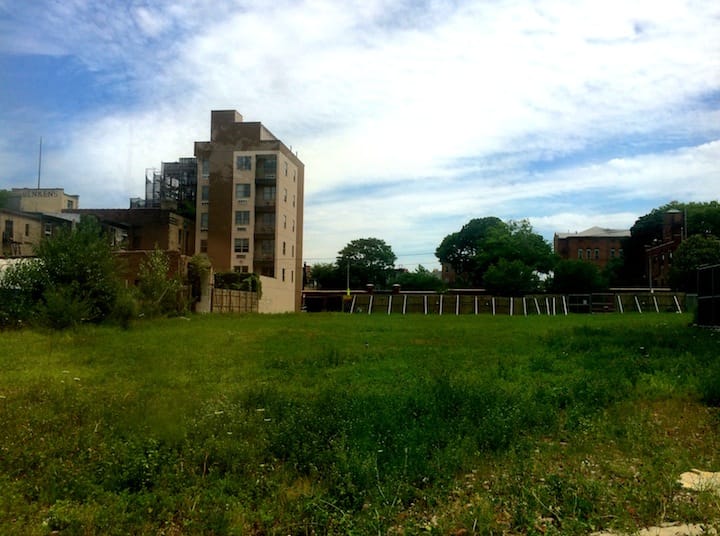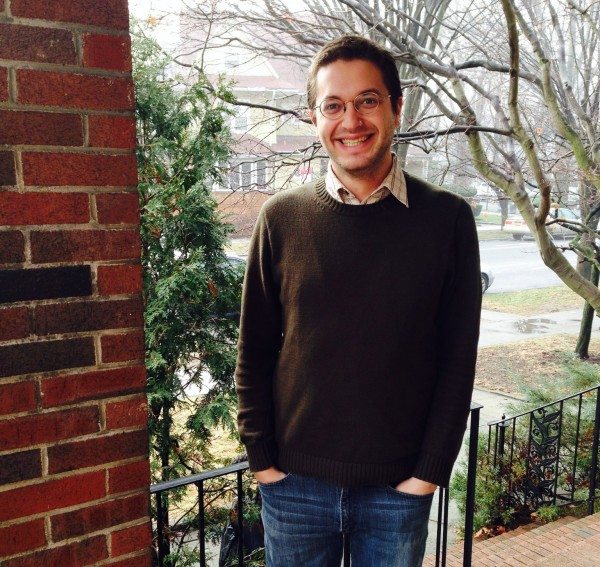Neighbor Ian Olasov Talks His Favorite Local Haunts, His Beginnings In Philosophy & A New Lecture Series At BPL


Ian Olasov grew up in Park Slope, initially moving to the Ditmas Park area about five years ago. Since then, the philosophy professor has taught at Brooklyn, Kingsborough Community, and Medgar Evers Colleges as well as one of our local temples, made a Cortelyou coffee shop his second home, and started Brooklyn Public Philosophers (BKPP), a discussion series featuring experts from our borough speaking on their respective areas of interest in the philosophy field.
Ahead of the next installment of Brooklyn Public Philosophers, to be held at 7pm on Wednesday, January 29 at the BPL’s Central Branch (10 Grand Army Plaza, accessible from the B/Q at 7th Avenue), Ian talked to us about his life in the neighborhood, his main influences, and some of the fascinating discussions that have been facilitated by BKPP so far.
What are some of your favorite things about the neighborhood, or things to do around here?
I love it here. I’ve spent many hours working on my dissertation at Cafe Madeline, so that has to rank among my favorite places in the neighborhood. Cafe Tibet, Mimi’s Hummus, and Don Burrito are definitely my favorite restaurants in the area.
It’s nice to be near the Brooklyn College library, too – not every neighborhood has a working research library, and that’s an especially cozy one. The Kent Theatre is also up there; there are only so many places like that left in Brooklyn, and I love how homey and rugged it is. I also teach at Temple Beth Emeth, which is very friendly and welcoming.
What initially sparked your interest in philosophy, and who are some of your favorite philosophers?
I’d like to think that I, like most people, was more or less born interested in philosophical questions – I talked a lot with my friends and my parents about God, the right way to approach one’s own death, the morality of eating meat, and objectivity in talking about music and movies.
I really got into philosophy in earnest, though, when I was a teenager and I started school at Bard High School Early College. I had two excellent teachers there – Bruce Matthews, who works on 18th and 19th century German philosophy, and Steve Mazie, a political scientist who, I’m excited to say, will be speaking at BKPP in May.
There were so many things that I found exciting about philosophy, the way that they taught it: I loved Kant’s moral theory, and I inherited, for a while, the view that there were moral facts, and that they could be discovered through reflection alone; I was scared and amazed on my first exposure to idealism, which in philosophy is the view that everything is either a part of or somehow constituted by our own thoughts and conceptual categories.
I was struck by the inventions of some of philosophy’s great system-builders – Spinoza, Kant, and Schelling – and by the clarity that philosophical systems brought to the problems I was interested in and the structure they gave to my everyday thoughts; and, less nobly, I just liked arguing with venerable and ancient philosophical texts; I liked that I was some kid from Brooklyn, but I could score dialectical points against Socrates in my marginal notes.
These days, my philosophical ambitions are a little bit more modest – I think philosophy can help people by clarifying confusions in conceptually problematic areas of science and culture, and I think that we can make some lasting progress in answering traditional philosophical questions by paying closer attention to the discoveries of psychology and other sciences, and by being more creative in devising ways of testing philosophical claims empirically.
There are a bunch of philosophers out there who do this well – a stunning number of them live in this city! – but Paul Grice and J.L. Austin are my heroes.
How did Brooklyn Public Philosophers come about, and how long has the series been going on?
I’ve had the idea of putting together a philosophy speaker series for a general audience for a little while. I really made up my mind last summer, though, after reading a little piece in Inside Higher Ed by Eric Jager called Public Speaking, in which he talks about the importance of scholars in the humanities sharing their work with non-academics.
If you’ve read any of the hand-wringing in the press about the crisis in the humanities, or about the irrelevance of much academic work to the people who fund it, then you can get a sense of why I think it’s important for academics to talk with the public about their work.
But putting the somewhat highfalutin politics aside, there are just so many talented philosophers in the city, doing really fascinating work on topics that lots of us care about, and people should have an opportunity to talk with them about their research.
The Brooklyn Public Library deserves a shout-out here. They have been ridiculously generous in hosting BKPP. It’s only a slight exaggeration to say that I walked in last July – sweaty, and carrying a guitar and a backpack – told them what I had in mind, and they handed me the keys to the space.
What’s been your absolute favorite topic so far? What kind of interesting discussions have resulted from each event–have any minds been drastically changed?
Favorite topic so far is a hard question! Jerome Wakefield gave a talk on the concept of mental illness which was really illuminating. I can’t speak for other people, but I think he might have convinced me (that mental illnesses are harmful mental dysfunctions).
In all of the coverage of the vexed release of the DSM-5, it seems like the discussion suffered because people were afraid of looking hard at the central question: what is a mental illness? The talk was really lively, and it went some way towards filling a gap in an important public discussion.
Rachel McKinney‘s talk on the varieties of coercion in interactions with the police was also really interesting, as well as practically useful, and Robert Lurz‘s talk on animal cognition raised a lot of interesting questions about experimental design, plus everyone likes looking at pictures of animals doing weird things.
I like that we have a good balance between social and political philosophy, which is often very obviously and directly related to current events and on-going social problems that people care about, and other areas of philosophy, like the philosophy of mind, philosophy of language, aesthetics, and philosophy of science, where philosophers often work on questions of interest to non-academics, but which aren’t necessarily keyed to current events.
Philosophy is often thought of as very removed from issues of everyday concern, or the things that ordinary people think about and talk about most of the time. I want BKPP to show how wrong that characterization can be.
Will folks who aren’t experienced in philosophy in an advanced or professional manner find the series accessible?
Yes, these talks are absolutely, 100% for people who don’t have a background in philosophy. I have been so pleased at the diversity of the crowd at the BKPP talks – people with very different educational backgrounds, old and young folks, a really neat range of ethnicities and religions.
Linda Alcoff, who is speaking on January 29th on racism and white racial identity, is great at keeping the jargon found in philosophical discussions of race to a minimum. That’s not to say that understanding and agreement are easy to achieve in philosophy; there is always a risk of misunderstanding between people who aren’t disposed to agree with one another, and Dr. Alcoff is speaking on a topic about which there is quite a bit of disagreement, but there’s no better way to come to understand someone else’s point of view than through civil, open-minded discussion.
One good example of this was a police officer who attended Rachel McKinney’s talk on interactions with the police. In her presentation, Rachel was often quite critical of common police practices, but the officer came right up to Rachel and me afterward, smiling, and told us how much he enjoyed the talk. This is what broadening philosophical conversations is all about.
Sound like something you’d find interesting? Keep up with Ian and guests at the Brooklyn Public Philosophers website, and see Dr. Linda Alcoff’s upcoming talk, The Future of Whiteness, at the Central Branch of the Brooklyn Public Library on Wednesday, January 29 at 7pm.



